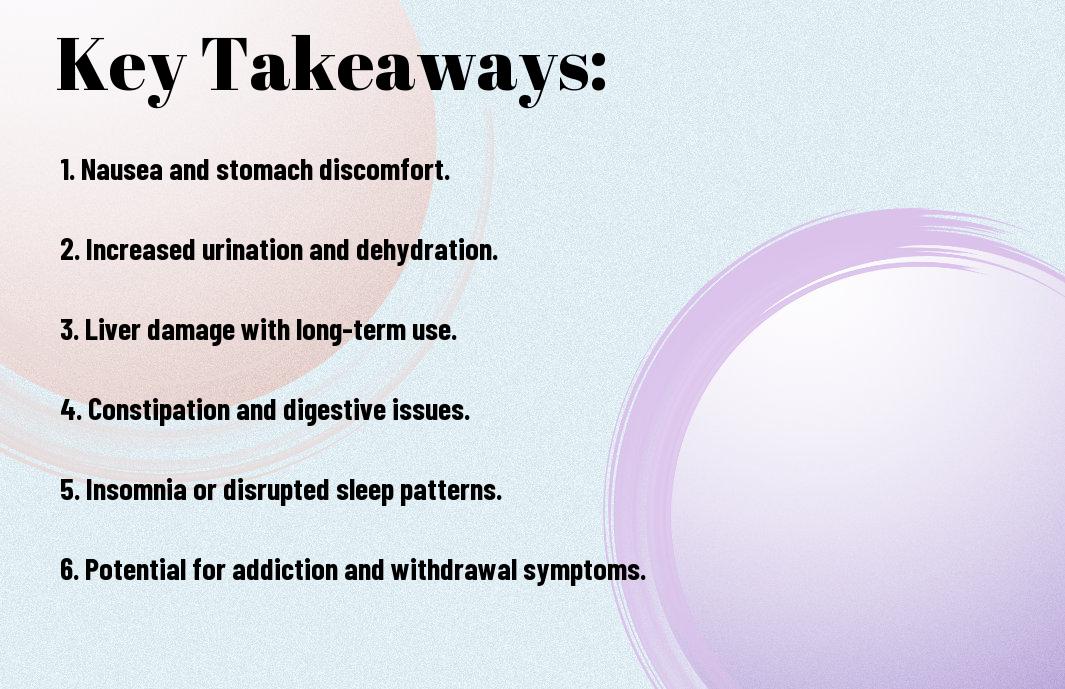Over the years, kratom has gained popularity as a natural remedy for various ailments. However, its side effects are crucial to understand. While some users may experience positive effects like pain relief and relaxation, others might encounter dangerous outcomes such as addiction, hallucinations, and liver damage. Awareness of these side effects is necessary for anyone considering using kratom for its potential benefits.
Key Takeaways:
- Kratom can have side effects: Just like any substance, kratom can have side effects that vary in severity from person to person.
- Common side effects include: Nausea, constipation, dry mouth, increased urination, loss of appetite, and sweating are some of the common side effects associated with kratom use.
- Seek medical attention if needed: If you experience severe side effects such as hallucinations, seizures, or difficulty breathing after taking kratom, seek medical attention immediately.

What is Kratom?
The use of kratom, also known as Mitragyna speciosa, has gained popularity in recent years as an herbal supplement for its potential therapeutic effects. Kratom is a tropical evergreen tree native to Southeast Asia, belonging to the coffee family. It is commonly consumed in the form of powder, capsules, or extracts.
Origin and History
History reveals that kratom has been traditionally used for centuries by the indigenous people of Southeast Asia, particularly in Thailand, Malaysia, and Indonesia. It was often brewed into a tea or chewed to boost energy levels and alleviate various ailments. The cultural significance of kratom in these regions reflects its longstanding presence as a natural remedy.
Chemical Composition
Composition: Kratom contains over 40 different alkaloids, with mitragynine and 7-hydroxymitragynine being the primary active compounds responsible for its effects. These alkaloids interact with opioid receptors in the brain, producing analgesic and stimulating effects.
Plus, the potency of kratom can vary widely depending on the strain and dosage consumed. It is crucial for users to be aware of the different strains available and their effects. Additionally, kratom’s psychoactive properties can lead to addiction and withdrawal symptoms if used irresponsibly or in high doses.
Common Side Effects
Mild Side Effects
Even though kratom is a natural substance, it is not without its side effects. Common mild side effects of kratom include nausea, constipation, and dizziness. These effects are usually short-lived and tend to diminish as the body adjusts to the presence of kratom.
Moderate Side Effects
With moderate kratom use, some users may experience more pronounced side effects such as drowsiness, irritability, and dry mouth. These effects can be bothersome but are typically not considered dangerous. It is important to monitor your kratom intake and adjust accordingly if you experience moderate side effects.
Plus, it is vital to note that moderate side effects can escalate if kratom is consumed in high doses or used in combination with other substances. Individuals with pre-existing medical conditions or those taking prescription medications should consult with a healthcare professional before using kratom to avoid any potential complications.

Less Common Side Effects
Respiratory Issues
With Dangers, Side Effects & Kratom Overdose, respiratory issues can occur as a less common side effect of kratom use. Some individuals may experience difficulty breathing, chest tightness, or shortness of breath after consuming kratom. These symptoms should not be ignored as they can be indicative of a serious reaction to the substance.
Gastrointestinal Issues
Painful gastrointestinal issues such as nausea, vomiting, and constipation may also be experienced by some kratom users. These effects may be more likely to occur in individuals who consume high doses of kratom or use it frequently. If you are experiencing persistent gastrointestinal problems after taking kratom, it is important to seek medical attention to rule out any underlying issues and discuss your kratom use with a healthcare professional.
This serves as a reminder that kratom, like any substance, can have a range of effects on the body, and it is necessary to be aware of how it may impact your health. If you are experiencing any concerning symptoms or side effects, it is crucial to seek medical advice promptly.
Rare but Serious Side Effects
Seizures and Convulsions
Effects of kratom are usually mild, but in rare cases, some individuals may experience seizures and convulsions after consuming the substance. These neurological side effects can be alarming and may require immediate medical attention.
Hallucinations and Psychotic Episodes
Effects of kratom may lead to hallucinations and psychotic episodes in some users. These symptoms can include vivid visual or auditory hallucinations, as well as paranoid or disorganized thinking. While rare, these side effects can be distressing and potentially dangerous.
The hallucinations and psychotic episodes associated with kratom use are more prevalent in individuals who consume large doses or use the substance frequently. It is imperative to monitor your kratom intake and be cautious of the potential for these severe effects.
Cardiac Arrest and Stroke
With kratom use, there is a small risk of experiencing cardiac arrest and stroke, which can have severe consequences. These cardiovascular events are rare but can be life-threatening and require immediate medical intervention.
This underscores the importance of using kratom responsibly and in moderation to minimize the risk of these serious side effects. It is vital to be aware of your health condition and consult a healthcare professional before using kratom, especially if you have a history of cardiac issues or high blood pressure.
Interactions with Medications
Opioids and Painkillers
Notably, kratom has the potential to interact with opioids and painkillers. Since kratom acts on opioid receptors in the brain, combining it with prescription opioids or painkillers can lead to respiratory depression, a potentially dangerous side effect. This interaction may increase the risk of overdose and other adverse effects.
Antidepressants and Mood Stabilizers
An interaction between kratom and antidepressants or mood stabilizers can also occur. Kratom’s effects on neurotransmitters such as serotonin and dopamine may be additive to those of certain antidepressants. This combination could lead to an increased risk of serotonin syndrome, a serious condition characterized by agitation, confusion, rapid heart rate, and even seizures.
Another concern when combining kratom with antidepressants or mood stabilizers is the potential for drug dependence or addiction. Both kratom and certain medications used to treat mood disorders can have addictive properties, increasing the risk of substance abuse when used together.
Blood Thinners and Anticoagulants
One interaction to be cautious of is between kratom and blood thinners or anticoagulants. Kratom has been reported to have anticoagulant properties, meaning it can thin the blood and increase the risk of bleeding. When combined with prescription blood thinners, such as warfarin, this effect may be magnified, potentially leading to bleeding complications.
Anticoagulants are used to prevent blood clots and treat conditions such as deep vein thrombosis and atrial fibrillation. It is crucial to consult with a healthcare provider before using kratom if you are taking these medications to avoid harmful interactions.
What are the potential negative side effects of using kratom?
Kratom benefits and drawbacks include potential negative side effects such as dizziness, drowsiness, nausea, constipation, and anxiety. Long-term use may also lead to dependency and withdrawal symptoms. It’s important to weigh the potential risks before using kratom and to consult with a healthcare professional.
Can Kratom Cause Negative Effects on Blood Pressure?
Kratom’s effects on blood pressure can vary from person to person. Some individuals may experience a temporary increase in blood pressure after taking kratom, while others may not notice any significant changes. It is important to monitor blood pressure and consult a healthcare professional if any negative effects are noticed.
Risk Factors and Contraindications
Now, let’s examine into the various risk factors and contraindications associated with the use of kratom.
Age and Health Status
An important consideration when using kratom is age and overall health status. Individuals who are younger or older may have different reactions to the herb due to varying metabolism rates and overall health conditions. Additionally, those with pre-existing medical conditions may be at higher risk of experiencing adverse effects when consuming kratom.
Pregnancy and Breastfeeding
With regards to pregnancy and breastfeeding, it is crucial to exercise caution when considering the use of kratom. There is limited research available on the effects of this herb on pregnant women and nursing mothers, therefore it is generally advised to avoid consumption during these periods.
Understanding the potential risks associated with kratom use during pregnancy and breastfeeding is vital to protect the health of both the mother and the baby.
Pre-existing Medical Conditions
Conditions such as liver disease, kidney disease, cardiovascular issues, and mental health disorders can be exacerbated by the use of kratom. It is important for individuals with such pre-existing medical conditions to consult with a healthcare provider before incorporating kratom into their wellness routine to avoid any potential adverse effects.
Status.
Conclusion
Presently, it is important to acknowledge that kratom, while sometimes touted for its potential benefits, also carries its share of side effects. These side effects can range from mild to severe and may include nausea, dizziness, constipation, and in extreme cases, respiratory depression. It is crucial for individuals considering using kratom to be aware of these potential risks and to carefully weigh the benefits against the side effects before incorporating it into their wellness routine.
Furthermore, due to the lack of regulation and oversight in the kratom industry, the quality and purity of kratom products can vary widely, leading to inconsistencies in dosages and potential contaminants. This underscores the importance of sourcing kratom from reputable vendors and using it responsibly. As with any substance, it is recommended to consult with a healthcare professional before using kratom, especially if you have any underlying health conditions or are taking medications that may interact with kratom. By staying informed and exercising caution, individuals can make informed decisions regarding the use of kratom and mitigate the risk of experiencing adverse side effects.
FAQ
Q: What are the common side effects of kratom?
A: Common side effects of kratom include nausea, constipation, dizziness, drowsiness, and dry mouth. These effects are usually mild and go away on their own.
Q: Are there any serious side effects associated with kratom use?
A: Yes, in some cases, kratom use can lead to more severe side effects such as seizures, respiratory depression, hallucinations, and addiction. It is important to use kratom responsibly and in moderation to prevent these serious effects.
Q: Can kratom interact with other medications?
A: Yes, kratom can interact with other medications, especially those that affect the liver. It is important to consult with a healthcare provider before using kratom if you are taking any other medications to avoid potential interactions.
Q: How can I minimize the side effects of kratom?
A: To minimize the side effects of kratom, start with a low dose and gradually increase it as needed. Stay hydrated, eat a healthy diet, and get plenty of rest while using kratom. Avoid mixing kratom with alcohol or other substances.
Q: Are there any long-term risks associated with kratom use?
A: There is limited research on the long-term effects of kratom use, but some studies suggest that prolonged use may lead to dependence and withdrawal symptoms. It is important to use kratom responsibly and be aware of the potential risks involved. Consult with a healthcare provider if you have any concerns about long-term kratom use.









